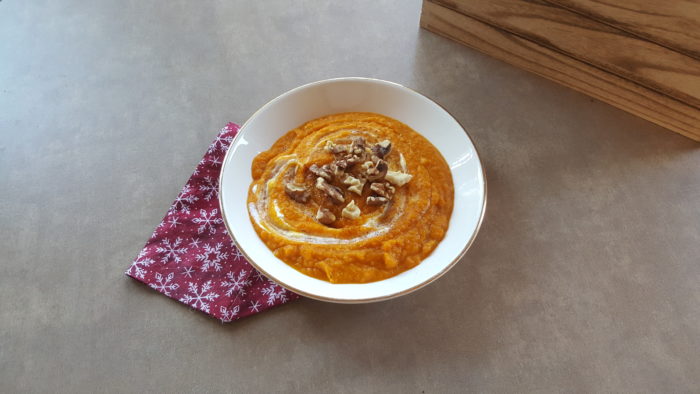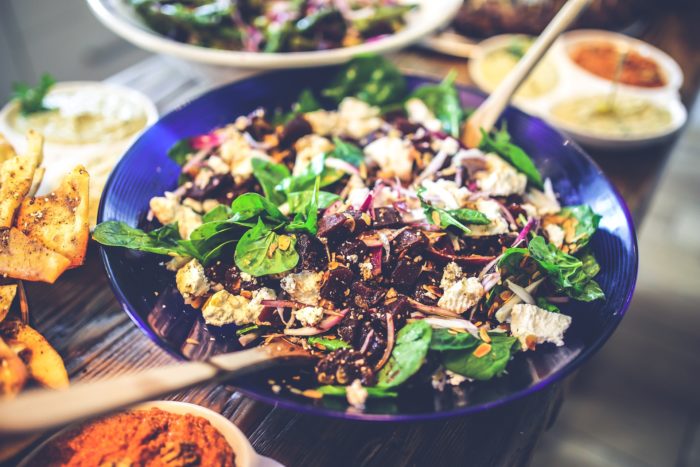Winter is here in North Carolina and can bring with it wild swings in temperatures and a lot of rain. Gone are the days of warm summer breezes, watermelon on the beach, and fresh garden cucumbers. Despite the lack of spring and summer produce, winter does offer a surprising array of its own seasonal options. It does not have to be a season to suffer through until we reach spring.
Eating a variety of fruits and vegetables year-round is really beneficial to your health. Consuming a variety of produce increases our intake of disease and inflammation fighting antioxidants, fiber, potassium, and vitamin C. Eating more fruits and vegetables can also help with weight management and gut health!
Seasonal Winter Produce
North Carolina offers a variety of local seasonal produce. Much of this can be found at local farmers markets, including the State Farmers Market in Raleigh. Some grocery stores, such as Harris Teeter and Lowes, often highlight local produce grown in North Carolina. Grocery stores in the area do offer some seasonal citrus fruits from more southern states during the winter as well.
Local Winter produce options include fruits like pears and apples. North Carolina can grow a variety of winter vegetables, such as butternut squash, acorn squash, spaghetti squash, sweet potatoes, kale, collards, greens, beets, spinach, turnips, and parsnips.
Winter fruits available from our more southern neighbors include oranges, clementine, tangerines, grapefruits, tangelo’s, pomelos and pomegranate.
How to Use Winter Seasonal Produce
If you are unfamiliar with these foods, you might be wondering how to use these foods in your daily meals. If you pick up your produce from the farmers market, talk to the farmer and ask for suggestions on how to incorporate these foods into your diet. Many produce boxes send recipe cards in the box or have a blog on their website that includes recipe suggestions. Check out the below ideas as a starting point.
- Citrus Salad: Chop or slice avocado. Place avocado, grapefruit slices, and orange slices over a bed of greens. Toss with olive oil, pinch of salt, and a light vinegar such as champagne.
- Roasted Beet Salad: Combine chopped and roasted beets with goat cheese, walnuts, and a drizzle of olive oil. Can be eaten alone or over a bed of greens. Great with the addition of orange slices.
- Citrusy kale salad: Massage kale with an olive oil-based dressing. Top with tangerine slices, pomegranate seeds, sunflower seeds, and a piece of cooked salmon for added protein and healthy fats.
- Roasted butternut squash or sweet potatoes add a boost of fiber to any dish.
- Bright and zesty lemon pasta: Lemons can be slow roasted until they are candied. These candied lemons make a delicious addition to a small amount of pasta or as a salad topper. Lemon juice can also be added to sauces or squeezed over fish or chicken for a zesty flavor that adds vitamin C.
- Add sliced pears to a salad.
- Pear Toast: Spread a thin layer of ricotta cheese or mascarpone cheese onto a piece of whole wheat toast. Top with walnuts, a drizzle of honey, and thin pear slices. Makes a great breakfast or a hearty snack.
- Making a roast chicken or pot roast? Add cubed parsnips and butternut squash to the roasting dish for added fiber and vegetables.
Other Winter Nutrition Tips
Include Healthy Fats
Some studies suggest that inclusion of healthy unsaturated fats can contribute to stability in mood and decreases inflammation. Try to choose fatty fish two times a week. This can include tuna, sardines, trout, and salmon. Other sources of unsaturated fat include olive oil, avocado, nuts, seeds, and nut butters.
Stay Hydrated
Cold water or cold fluids can be unappealing during the winter months. Try a hot beverage to help you hydrate!
- Hot tea. Most options can be purchased caffeine free. Many herbal teas are naturally caffeine free.
- Coffee/decaffeinated coffee can count towards your fluid intake in moderate amounts. Be mindful of any sugary or high fat add-ins.
- Hot chocolate can be an occasional treat.
- Hot lemon water with a cinnamon stick, cardamom, and star anise makes a lovely hot beverage.
We hope this inspires you to get creative in the kitchen and try some different using winter produce.
Interested in learning more about healthy eating that will fit your lifestyle? An Avance Care Dietitian is available to help with both in-person and virtual appointments. Visit here to learn more!
Resources
https://files.nc.gov/ncoshr/Wellness_AvailabilityChart.pdf




